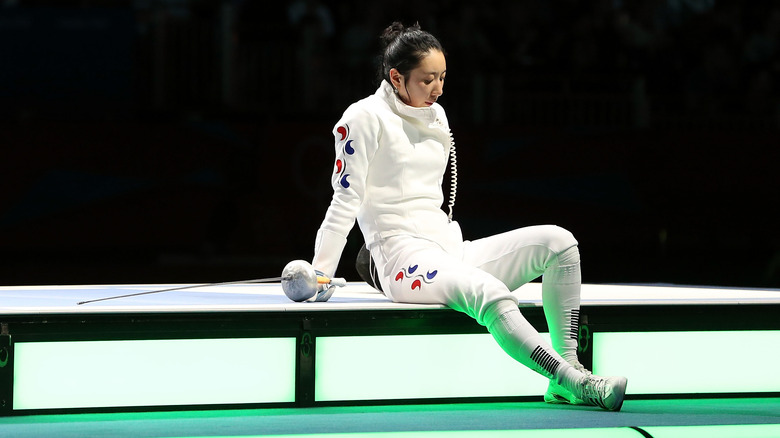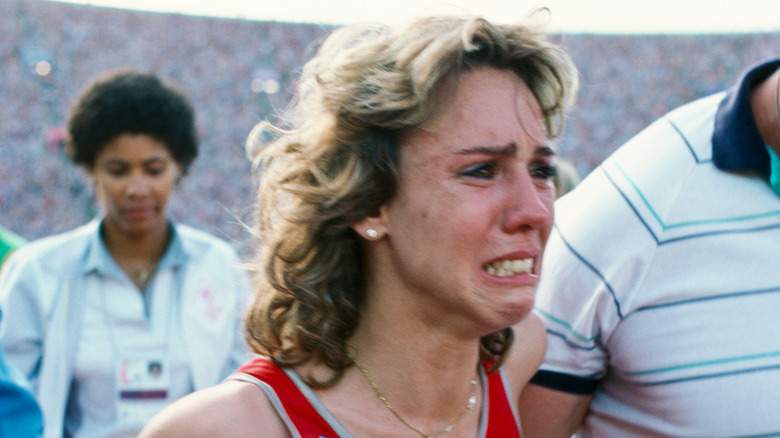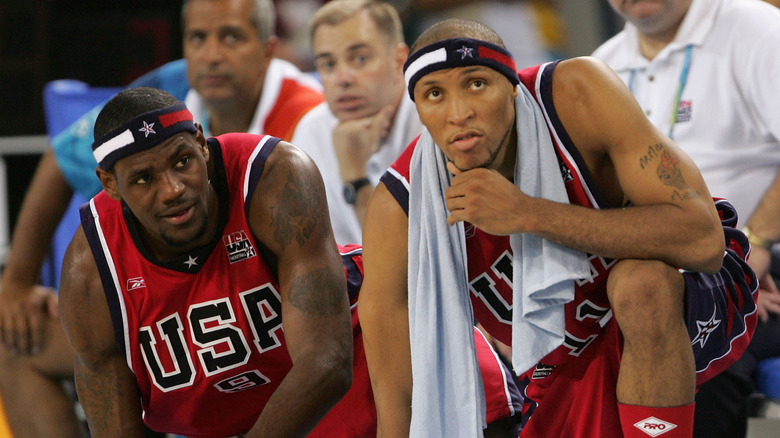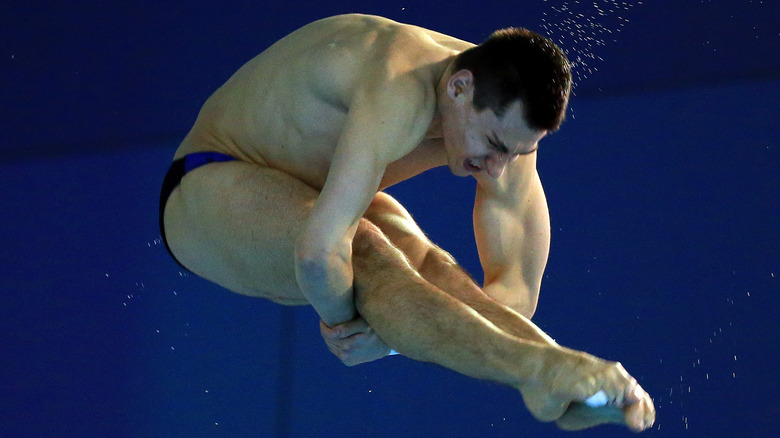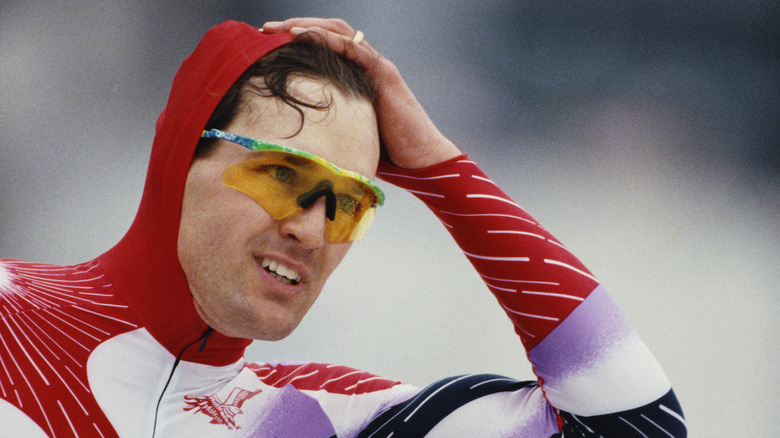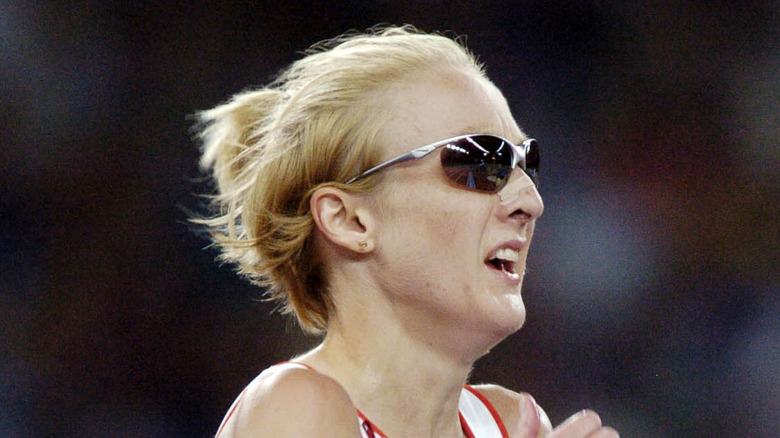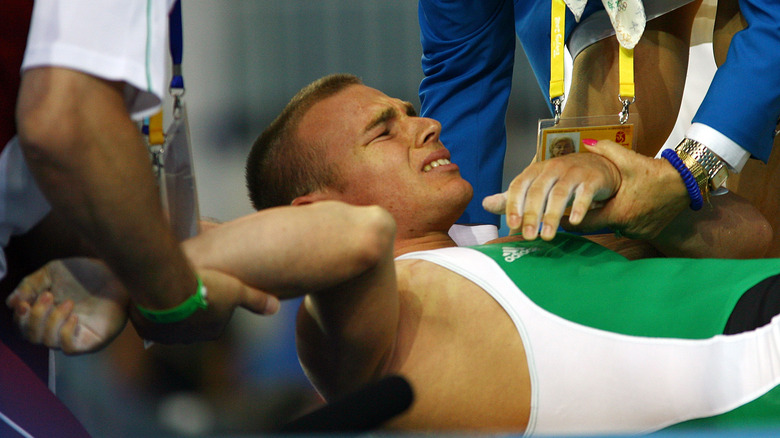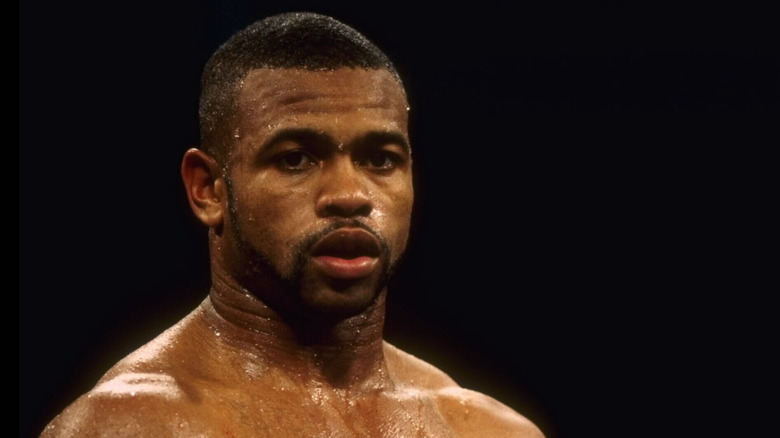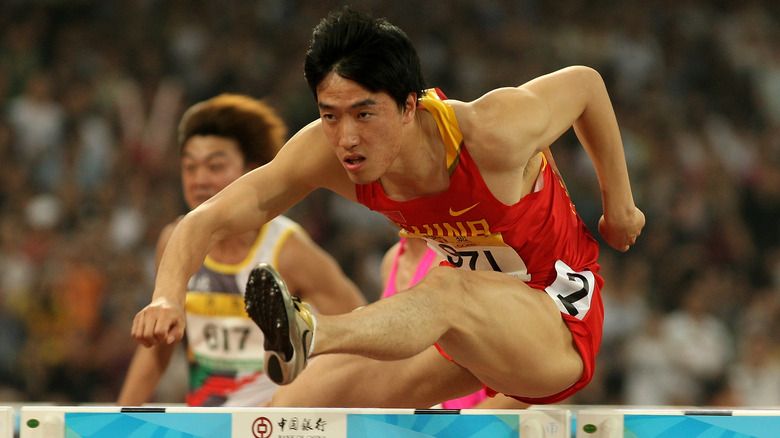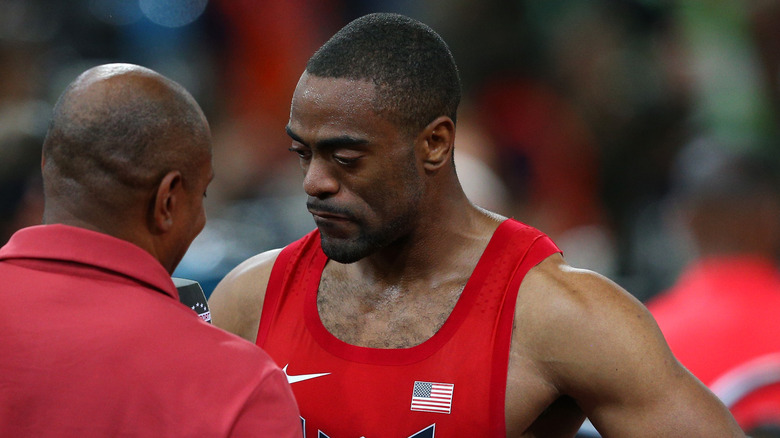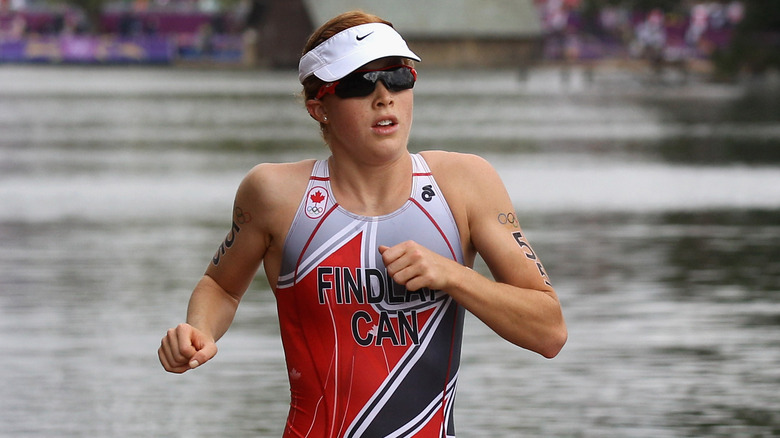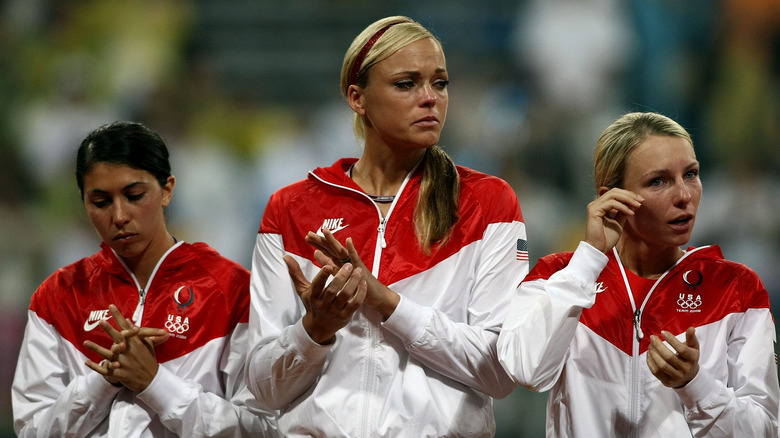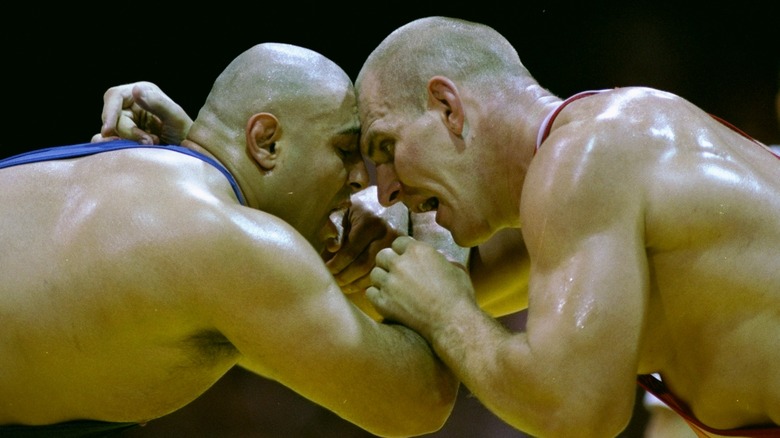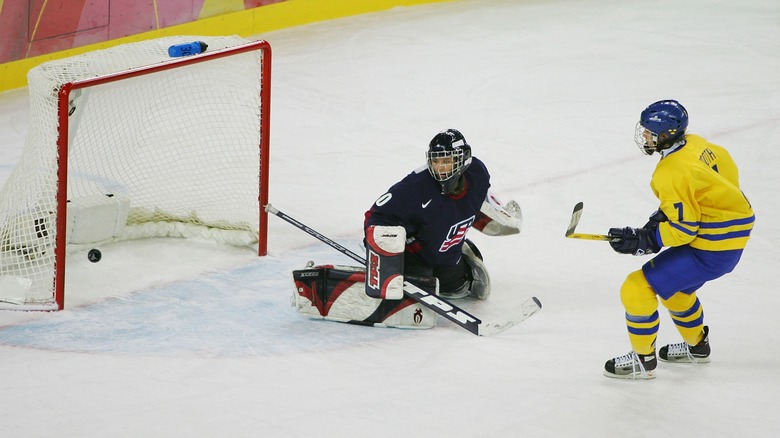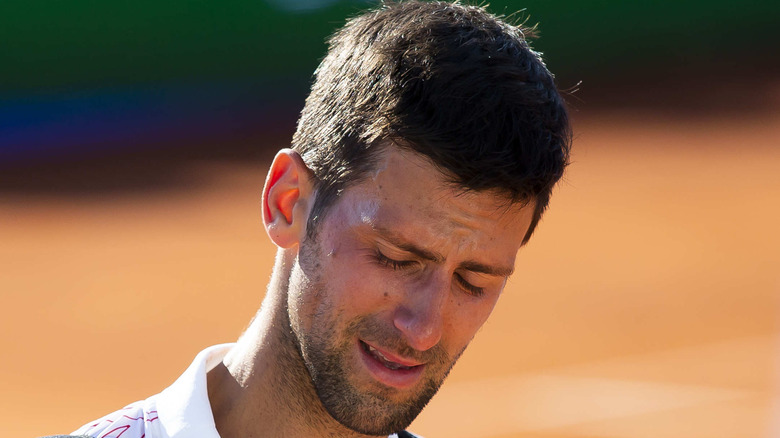Olympic Athletes Who Saw Their Dreams Destroyed On Live TV
To reach the pinnacle of their respective sports, some Olympians spend their entire lives training. With so much dedication and hard work all leading up to one moment, there are both triumphs and devastations. Take, for example, the 2016 Summer Olympic games held in Rio de Janeiro, Brazil. A video recap posted by the Olympics showed many tears throughout the entirety of the event. Some were tears of joy, like when the Brazilian men's football team won the gold medal in its home country. Others were tears of sadness, while some were completely unprecedented — like when superstar Michael Phelps said goodbye to the games after his incredible career. He'd earned the "highest number of medals in the entire Olympics — 28 medals across five Summer Games," per the Olympics.
All Olympians have one thing in mind — winning the gold medal for their country and as a personal achievement. But when the chance to win slips away, the results are crushing. Even worse, these moments of defeat are captured on TV for all the world to see. Whether it's a controversial call from a judge, a momentary lapse in concentration, or just losing to a superior opponent — all lead to the same result, a loss.
It's time to look at the Olympic athletes who saw their dreams destroyed on live TV.
One bad call ruined fencer Shin A-lam's Olympic moment
As explained by The Globe and Mail, "The tip of a fencing blade is widely considered the second fastest moving object in sport, behind a marksman's bullet." And unfortunately for Shin A-lam, she was on the losing side of a split second decision. Shin, from South Korea, was in a fencing match with Britta Heidemann from Germany in the 2012 Summer Olympics held in London. Shin landed two double-touches against her opponent with only one second left until the end of the match, leaving victory practically guaranteed. But then, the referees added an additional second back on the game clock. Heidemann seized the opportunity and "unleashed a blistering surge forward, hitting Shin while also avoiding her blade."
After the clock expired, the fencer from South Korea looked devastated. "An indelible image of Shin will linger in the memory, a 25-year old looking dejected as she sits on a dramatically spot-lit piste, pristine in her white uniform with a towel draped over her shoulder," the article described. Shin protested for an hour about the officials adding the extra second, until she "was physically escorted off the piste."
Perhaps even worse, officials later reviewed the decision and admitted an error in the semi-final match. "Fencing's governing body, the Fédération Internationale d'Escrime," offered Shin a special consolation medal, which she turned down, per Yahoo! Sports. And she lost the bronze medal match, leaving the fencer empty-handed in the individual competition.
How two Olympic runners saw their hopes ruined in one moment
In 1984, American runner Mary Decker was the favorite to win the gold in the women's 3000-meter track final. And one of her competitors, Zola Budd from South Africa, had been in the news for her incredible story. The 18-year-old couldn't compete as a South African, since the country was banned from the Olympic games during its apartheid era. Budd's grandfather was British, so the runner "was able to obtain citizenship and run for Great Britain," Runner's World recapped.
During the race, both women were running well. That is, until Decker became entangled with Budd and fell down on the track. As detailed by The New York Times, Budd continued to run, but recounted to Daily Mail, "I couldn't believe it. It was terrible. I wanted to stop. I wanted it all to end." She added, "I didn't know what had happened except that Mary had somehow run into me. At that point I didn't think I'd done anything wrong." That is, until Budd "heard the boos."
The photo of Decker on the track in tears after the collision "went on to be one of the most published sports pictures of the decade," according to Runner's World. For Budd, she finished seventh in the race, but the backlash was the worst part. The Guardian explained that Budd "had received so many death threats that a team of armed police met her at the airport" for her flight back home.
The nightmare teams against the U.S. men's basketball team
In 1992, the Olympics allowed professional basketball players, most from the NBA, to compete. In the first year under this new rule, the United States assembled the "Dream Team," composed of megastars like Michael Jordan and Magic Johnson. After going 24-0 in all Olympic basketball matches since then, the streak ended during the 2004 Summer Olympics in Athens, Greece. The U.S. men lost 92-73 to Puerto Rico, ESPN reported. Not only did it break the team's perfect record for over a decade, it was also only "the third loss ever for the U.S. team." Stars of the team like Tim Duncan and Allen Iverson could only hang their heads in disbelief.
"I'm humiliated," coach Larry Brown said at the time. Fortunately for the U.S. men's team, the defeat came early in the competition. "The loss was a blow to the Americans' confidence, but it did little to hurt their gold medal chances. They need only to finish in the top four of their six-team group to reach the quarterfinals," the article explained. And the team delivered, reaching the semifinal match against Argentina.
However, they disappointed again as Argentina went on to win the semifinal. In a video of the match posted by the Olympics, the U.S. players see their hope disappearing in the final seconds. Then the match is sealed with a huge dunk — a figurative slam in the face — by player Luis Scola from Argentina.
An embarrassing moment for diver Stephan Feck
Olympic diving is a mix of precision and grace. It takes world-class skill to twist and turn in the air on the way towards the pool, while still producing a barely noticeable splash. At the 2012 Summer Olympics in London, Stephan Feck from Germany aspired for the perfect dive. He was participating in the second preliminary round of the men's three-meter springboard competition. As recapped by BBC Sport, Feck's "foot appeared to slip off the side of the diving board and he entered the water on his back, before being awarded a failed dive."
But the journalistic description in no way describes the embarrassment for Feck and the shock of viewers watching the dive happen in real time. The video shows Feck arch his back, spring off the board, and flip in the air — all before reverse-belly flopping in the pool. The loud "thwack" and splash when his back hits the water is met with complete silence in the stadium immediately after. The "calamitous dive" led to Feck exiting the pool with a face that certainly knows his chances are ruined.
Thanks to the internet, Feck had to relive his embarrassing experience over and over. The video went viral and Feck became "a household name but for all the wrong reasons," according to Bleacher Report.
The awful Olympic experience for speed skater Dan Jansen
U.S. speed skater Dan Jansen had just won the World Sprint Championship one week before his appearance in the 1988 Winter Olympics in Calgary. But the Olympian learned mere hours before his race that his sister had died of leukemia, per History. Jansen, "a favorite to win the gold medal in the 500-meter race," didn't drop out and lined up to race. According to the article, Jansen's sister "had been instrumental in his speed skating career." And, even after delivering the awful news, Jansen's family urged the skater to still compete. In what could have been an emotional victory, only "seconds into the race, Jansen slipped and fell."
In a documentary posted by Team USA, Jansen described the terrible moment. "I got to the first turn. Really, one step into the first turn, and my left skate slipped out and down I went," he said. Despite the untimely fall, Jansen still had a chance at redemption later in the Olympics for the 1000-meter race. "I tried to get myself together in those three days. It was hard, but it was better," Jansen said of his preparation for the next race. Then, in the two-and-a-half lap race, Jansen was in the lead for two of the laps. "[I] was on a world-record pace. Then I caught an outer edge and went down," he remembered.
For the second time over a few days, Jansen's hopes for an Olympic medal ended instantly.
Marathon runner Paula Radcliffe ran out of gas
In the 2004 Olympic Games held in Athens, Greece, the women's marathon featured an impressive mix of athletes. The event was extra special because "the first organized marathon was held in Athens at the 1896 Olympics, the start of the Games' modern era," History reported. The marathon was inspired by a Greek messenger who ran between the cities of Marathon and Athens. The messenger supposedly arrived, delivered the news, then collapsed and died from exhaustion. The format then moved to an official 26.2 miles at the 1902 Olympics in London to allegedly meet the wishes of Queen Alexandra.
British marathoner Paula Radcliffe had this historical context behind her as one of the hopefuls to win the 2004 event. Prior to the race, the runner "had gained a reputation for missing out on international silverware," according to Sky Sports. Her run in Athens was Radcliffe's third time appearing in the Olympics, but fatigue quickly set in. "The hardest part was when I realized that I couldn't hold a straight line," she remembered, noting when her body wasn't performing as intended. "I found myself running in the gutter, without any control over where my legs were taking me."
Through the pain, Radcliffe continued to push her limits even as she slowed down. She finally hit her limit and stopped running the race. A video of the event shows the runner sitting on a patch of grass, appearing distraught that she couldn't finish.
Weightlifter Janos Baranyai was injured on live TV
The Olympic snatch weightlifting event requires impressive muscles and coordination to pull a heavy bar from the ground directly into an overhead position in one fluid movement. While at the 2008 Olympics held in Beijing, China, Janos Baranyai from Hungary prepared to lift the extremely heavy bar. As he pulled the weight up from the ground, Baranyai encountered a terrifying experience. A video of the lift shows the weightlifter's shoulder buckle from the load. The bar then drops on his back as he falls to the floor, screaming in pain. He dislocated his shoulder as a result of the accident as a member of his team rushed to help.
"I've never felt such pain," Baranyai told the AP after the incident (via ESPN). "I'm not a delicate kid, but that was brutal," he added. Though the video of his accident gained a lot of attention online, the weightlifter claimed he only rewatched the lift twice, noting that he viewed the incident just to look for the mistake that led to his injury. "I didn't find any mistakes and I'd do it over in exactly the same way. To this day, I don't know what the problem was," he admitted.
Fortunately, the Olympian was able to bounce back from the injury. "Spiritually, this injury did not break me at all," he said. Baranyai even got a tattoo that said "Beijing 2008" a few months after his injury.
Boxer Roy Jones Jr. couldn't believe his eyes
Boxing in the Olympics has a storied history, especially for the United States. In the 1960 Olympic Games held in Rome, an 18-year-old Cassius Clay competed in the light heavyweight division. The boxer "won all four of his fights easily. In the final he defeated three-time European champion Zbigniew Pietrzykowski to win the gold medal," the Olympics recapped. This helped launch the career of Clay, who went on to be better known as Muhammad Ali.
Roy Jones Jr. perhaps had similar aspirations when he competed for America in the 1988 Olympics in Seoul, South Korea. The boxer went up against the hometown favorite, Park Si-hun, in the gold medal match. Jones Jr. completely dominated the boxing match, as recounted by The Guardian. The American "landed 86 punches to Park's 32" during the bout. By the end, the boxing match was reportedly "an utterly one-sided affair" in favor of Jones Jr. Except when it came time for the decision, three of the judges voted for Park and only two for Jones.
As the referee held up Park's hand as the victor, the boxer from South Korea allegedly whispered to Jones Jr., "I can't believe they're doing this to you." The American was stunned. "That's the worst I've ever been dealt in my life. They put the silver medal around my neck, and I took it right off. I won't put it around my neck ever again," Jones Jr. said.
Hurdler Liu Xiang disappointed the local fans due to an injury
The men's 110-meter hurdling event at the 2008 Summer Olympics featured a local favorite. Liu Xiang, one of China's brightest track stars, was carrying the hopes of the entire nation as he was preparing to compete. At the time, Liu was regarded as one of the most famous athletes in all of China "because of his blend of looks, personality and sustained success," per The New York Times. Liu won the gold medal in the 2004 Olympic Games in Athens, as shown in a video recap. This was a historic moment, too, as he "became the first Chinese man to win an Olympic Gold medal in athletics and his time of 12.91 seconds also equaled the 11-year-old world record."
Set to defend his gold medal four years later, things weren't looking good for the hurdler. "I didn't feel right when I was warming up before the race. I knew my foot would fail me. I felt painful when I was just jogging," he recalled of the 2008 race. A video of the event shows Liu line up and start running after the qualifying race commences. Officials stop the race after a false start and all runners return to their starting blocks. But Liu is seen limping back on the track. After a few moments, the injured Olympian walks out of the stadium before the race starts again.
"I feel sorry. I could do nothing but pull out of the race," Liu later said, per The New York Times.
Sprinter Tyson Gay's painful final finish at the Olympics
Thanks to Usain Bolt, one of the wealthiest Olympic athletes, the men's sprinting events in track-and-field became the can't-miss events of the Olympic games. In 2008, Bolt, from Jamaica, went up against American Tyson Gay, who held the world record for the 100-meter sprint. Bolt beat Gay at the race in Brooklyn and set a new world record of 9.72 seconds, via a video posted by the Olympics. Later that year, at the 2008 Summer Olympics in Beijing, China, Bolt won his first gold medal. He also set another new world record, 9.68 seconds, even after appearing to slow down toward the end to look back at the other racers and pound his chest in triumph.
In 2012, Gay looked to retain his glory as he squared off against Bolt in the London Olympics. He also faced Jamaican Yohan Blake and American Justin Gatlin. Gay came in fourth place to those three other men "in the most painful way possible. He finished fourth to Gatlin by one one-hundredth of a second," ESPN reported. As seen in a video from the Olympics, Bolt once again won the gold medal with his fellow countryman Blake earning the silver medal. Immediately after the race, Gay was seen crying.
"I really tried to do it for my family, but I came up short," Gay told reporters. "I felt like I ran with the field and I just came up short. That's all I did."
The chance of a lifetime slipped away for triathlete Paula Findlay
The triathlon is an incredible event for the fact that participants must dominate in three distinctly different activities — running, swimming, and biking. Leading up to the 2012 Summer Olympics in London, Canadian triathlete Paula Findlay didn't have much time to prepare. According to Maclean's, the athlete was dealing with an injury. This left her only able to train at the full Olympic distance for only two months prior to competing in London. Still, Findlay was hopeful to compete well and bring home a medal for her country. This was also her first time competing in the Olympics, so her family traveled to watch her big moment.
Instead of glory, Findlay was completely overwhelmed by her competition. Per the outlet, she finished "52nd and last place Saturday, running and crying, and crying and running. She wanted to quit so badly, to walk off the course."
After the race, Findlay recalled what was going through her mind during the race. "I was thinking about all my friends back home who stayed up until 2 o'clock in the morning to watch me, and my friends along the course — and my family here," she said. And due to the disappointing last-place finish, Findlay expressed, "I feel terrible. I'm really sorry to everybody in Canada." The former world-champion confessed that despite her "big hopes" in the race, "unfortunately I couldn't fulfill them."
The shocking conclusion to the U.S. women's softball team
In the gold medal match for women's softball in the 2008 Beijing Olympics, the team from Japan were total underdogs. Softball's debut as an Olympic sport started during the 1996 Summer Olympics in Atlanta, Georgia. That first year, the U.S. women's team won the gold medal — and the team never stopped winning the big prize, taking home the gold medal every Olympics after. Even more, "It had beaten 22 consecutive opponents dating to 2000," The New York Times reported.
The team's domination continued through the 2008 Olympics, by out-scoring all opponents by 57-2 on route to the final. This included beating the Japanese team twice in the tournament before the final. And yet, at Fengtai Softball Field, Japan walked away with a gold medal after defeating the U.S. 3-1. "Sometimes the game looks easy," the U.S. team's coach, Mike Candrea, said. "And it really isn't." Perhaps even worse, all members of that U.S. team knew it could be their last time playing in the Olympics. 2008 was the last scheduled year for softball before an "indefinite absence." After the defeat, one of the pitchers for the U.S., Cat Osterman, said, "I really haven't thought about the big picture yet. The loss just hurts too much in the present moment."
Softball was reinstated for the 2021 Olympics, where the U.S. women's team would compete to reclaim their dominance on the world stage, per NCAA.
The end for Russian strongman Aleksandr Karelin's Olympic dominance
Aleksandr Karelin, a Russian wrestler in the Greco-Roman format, was easily the best athlete in his sport. The Greco-Roman style is "arguably the oldest competitive sport in the world" and was a highlight of the 1896 Olympic Games in Athens, Greece, the Olympics explained. The sport is characterized by the athletes using "only their arms and upper bodies to attack, and can only hold those same parts of their opponents." No legs are allowed like in freestyle wrestling. And Karelin used his upper body in dominating fashion.
Going into the 2000 Summer Olympics held in Sydney, Karelin had won the previous three gold medals. He hadn't lost in 13 years, "had never lost in international competition," and "had not been scored upon in 10 years," ESPN reported. And allegedly, the previous two gold medal finalists against Karelin "essentially quit on the mat rather than keep absorbing the pounding they were taking."
In the gold medal match, via an Olympics video, Rulon Gardner from the U.S. went up against Karelin. Gardner's previous best finish was fifth place in an international competition, so no one expected him to win. Yet Gardner shocked the wrestling world when he appeared to score a point against Karelin. Judges paused play to review the wrestling move and after 90 long seconds, awarded Gardner the point to go up 1-0. Karelin ultimately conceded and Gardner remembered his opponent "mumbled a few words at me in Russian toward the end."
The lowest moment for the U.S. women's hockey team
In women's Olympic ice hockey, the results of the final match are pretty much always the same. "The United States won the first women's hockey gold medal in 1998, and Canada has won every one since then," The New York Times reported in 2018. Despite losing every time, the U.S. women's team at least made it to the finals to face off against Canada in (almost) every Olympics, and also went head-to-head against Canada's team "in all 20 world championship finals."
The one exception to this long-standing rivalry was in 2006. In that year's Olympic Games, hosted in Turin, Italy, the U.S. women's team did well in the early stages, and just needed to beat the team from Sweden to advance once again to the finals. The U.S. team went up against Sweden 2-0 to start, looking poised to win the match, as seen in a video of the game. But Sweden fought back and scored two unanswered goals. Time ran out with both teams tied, and the game went into a decisive shootout. The American women didn't score a single shootout goal. When Sweden scored their second goal in the shootout, the game was over.
The U.S. side could only hang their heads in disbelief as they shook hands with the opposing Swedish players.
Tennis star Novak Djokovic's emotional exit from the Olympics
In 2021, Serbian tennis player Novak Djokovic won the Wimbledon final in London, England for the sixth time. It also was Djokovic's 20th Grand Slam title, which tied the record previously "shared by Rafael Nadal and Roger Federer," NPR reported. And because Djokovic already won the Australian Open and the French Open in 2021, this set the tennis star up for a golden opportunity. "Djokovic also has the chance to become just the second player in tennis history after Steffi Graf to secure a 'Golden Slam' by winning all four majors and an Olympic gold medal in the same year," the article noted.
Even with his historic resume, Djokovic has still never won Olympic gold, as of this writing. Only two other men's players — Andre Agassi and Rafael Nadal — have won each of the four majors and an Olympic gold, according to The Guardian. In the 2016 Summer Olympics in Rio de Janeiro, Djokovic faced off against Juan Martín del Potro from Argentina in the first round. And just like that, he was out after losing in two straight sets — both tiebreakers. In a video of the match, Djokovic leaves the court in tears.
"No doubt this is one of the toughest losses in my life and in my career," Djokovic said after the match (via The Guardian). "It's not easy to handle, especially now, just after the wounds are still fresh. But, you know, you have to deal with it."


